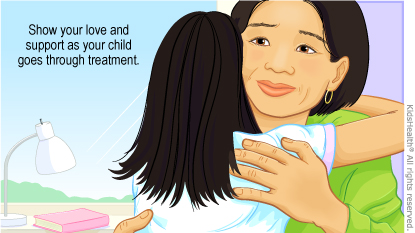Anorexia Nervosa: How to Care for Your Child
Anorexia (also called anorexia nervosa) is an eating disorder where someone eats very little, is very fearful of gaining weight, and sees their body differently than others do. People with anorexia are cared for by a team of medical specialists to help them reach a healthy weight, develop healthy habits, and change the way they think about food and their body.


Follow the care team's recommendations for:
-
your child's meal plan. (A meal plan will tell you what your child should eat in a day to stay healthy. Help your child to follow this meal plan.)
-
whether your child needs any medicines, nutritional supplements to increase calories, or vitamin supplements
-
whether it's OK for your child to exercise and what kinds of exercise they can do
-
whether your child should weigh themselves
-
helping your child set limits for social media use
-
going to follow-up care visits
Help your child have a healthy body image.
-
Be a role model. Talk about your body in positive ways. Don't criticize your own weight, body, or looks, or those of other people.
-
Avoid talking about weight.
Support your child's overall well-being by helping them:
-
Get enough sleep.
-
Find ways to manage stress and improve mood. They might enjoy listening to music, drawing, dancing, writing in a journal, or talking to a friend. Yoga, meditation, or taking a couple of deep breaths also can help your child relax.

Your child:
You have any other concerns.

Your child:
-
is lightheaded or dizzy, or faints
-
appears dehydrated; signs include dizziness, drowsiness, a dry or sticky mouth, sunken eyes, or making less pee or darker than usual pee
-
has trouble breathing, chest pain, or an irregular heartbeat
-
has a seizure
If you are worried that your child may try to commit suicide (end their life) or they have talked about a specific plan for suicide, take your child to the ER.
You or your child also can call or text the National Suicide Prevention Lifeline at 988.

What causes anorexia? The exact cause of anorexia isn't clear. It probably happens from a combination of a genetic (inherited) tendency, psychological issues, and social pressure to be thin.
What are the symptoms of anorexia? Kids with anorexia have an extreme fear of weight gain. They try to eat as little as possible and might exercise too much or do other things to lose weight. They may become very thin. They may also feel cold or tired, have dizziness or fainting, hair loss, dry skin, and trouble concentrating. Girls may stop having periods. Without treatment, anorexia may lead to weak bones, anemia (low red blood cells), and life-threatening heart problems.
While more common in females, anorexia can affect males too.
How is anorexia treated? Anorexia is treated by a care team of specialists that includes doctors, behavioral health providers, and a dietitian. These experts work together to monitor the child's medical health, provide counseling, and make dietary recommendations.
Some kids can be treated at home with close follow-up with the care team. Others may go to a special program during the day to get help. Some kids need to stay in the hospital to make sure they get the treatment they need.